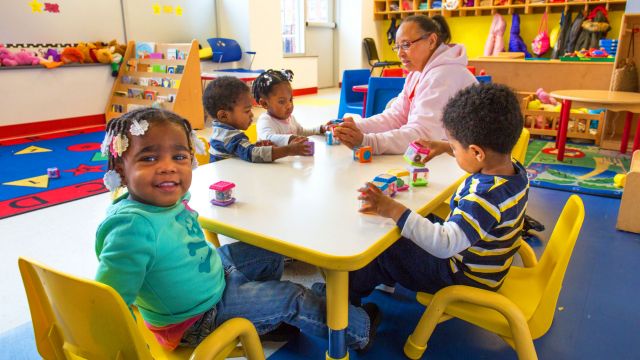Engaging Families in Children’s Learning
Engaging Families in Children’s Learning
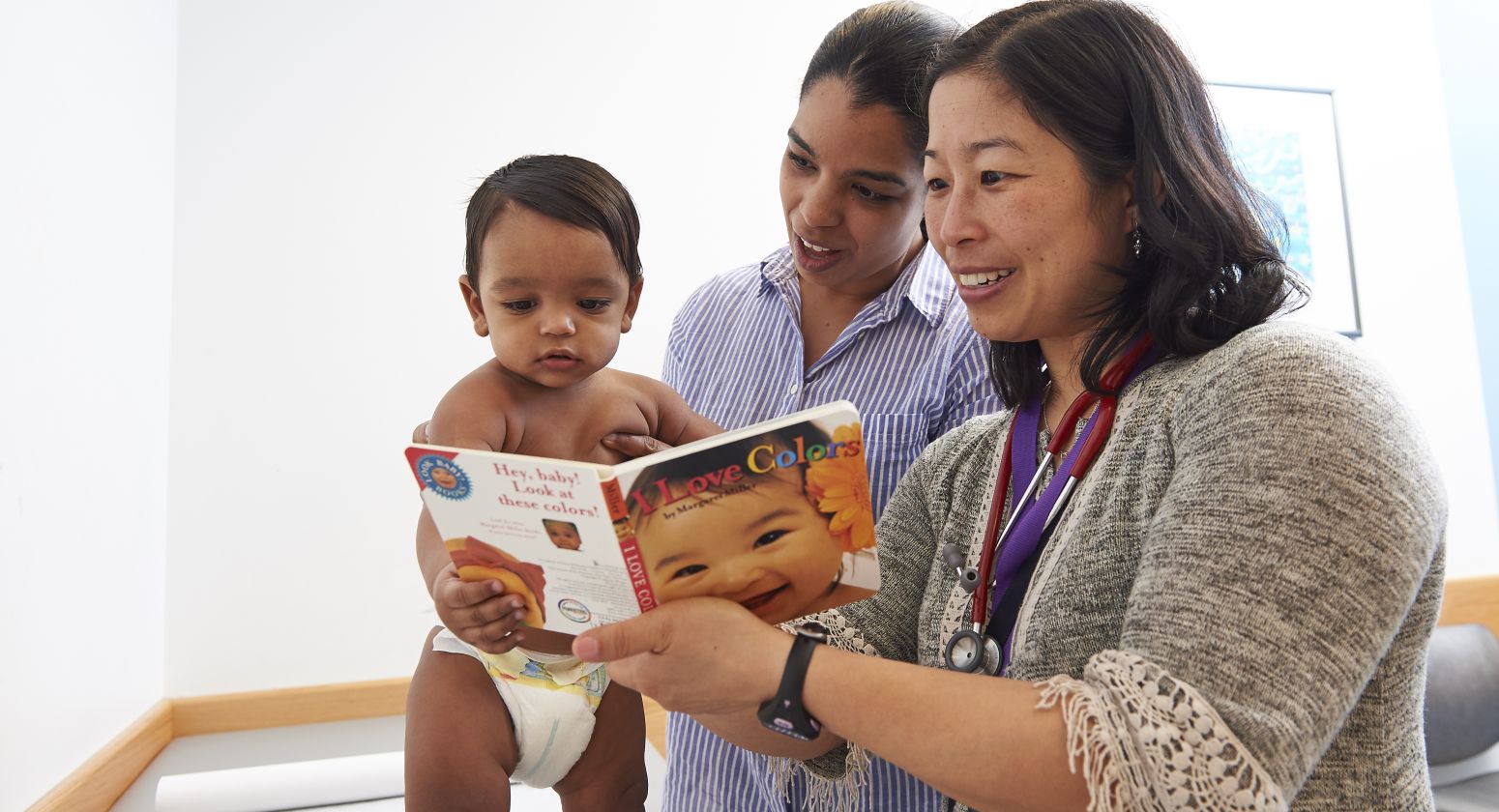
The learning process begins at birth. A baby’s babbling is a sign of learning. When her caregiver responds with encouraging words, the exchange becomes a bonding moment that helps build the baby’s early language skills.
All caregivers – including parents, guardians, grandparents, and other caring adults – want to give their children a strong start. We support organizations that engage families in a variety of ways to help adults nurture children’s language and literacy skills. Our goal is for all caregivers to have effective opportunities to support their children’s early learning. This work relies on trusted messengers who deliver key messages about child development, early learning, and school readiness in clear, culturally relevant, and positive ways.
Check out our Theory of Change to learn more about how and why we support this work.
Click each title below to learn about some of the programs and initiatives we support to engage families in children’s early learning.
Decades of scientific research show that home visits from a nurse, social worker, early childhood educator, or other trained professional shortly after the birth of a child improve the lives of children and families. During a home visit, families learn and practice healthy parenting techniques, discuss challenges, ask questions, and learn about child development. The trusting relationship and regular visits create an opportunity to support parents and caregivers in their role as their child’s first teacher.
In research supported by the William Penn Foundation, Child Trends identified an opportunity to ensure families are connected to the home visiting program that best matches their needs, as more than a dozen individual programs are offered in Philadelphia. With funding from the Foundation, the Philadelphia Department of Public Health and home visiting providers collaborated to create the city’s first centralized intake system for home visiting services: Philly Families CAN. The web-based tool acts as a “one-stop-shop,” making it easier for families – and for organizations that refer clients to home visiting – to access these services and understand the different types of programs that are available. Philly Families CAN supports enrollment and data collection for multiple home visiting providers, allowing for more efficient and effective matches between families and available services.
Child Trends also identified several opportunities to strengthen and expand the home visiting services available to families, including a need for more and better professional development opportunities to help all home visiting providers engage and retain families and staff. In response, the Foundation supports Health Federation of Philadelphia to develop and provide a suite of in-person and online opportunities for professional development and peer learning for home visitors and program supervisors. This work has helped establish a local community of practice for home visitors.
In 2022, the Foundation awarded a $5.4 million grant to the National Nurse-Led Care Consortium (NNCC) to expand its Family Support Fund and its Nursing-Legal Partnership, which provide critical financial and legal support to Philadelphians enrolled in NNCC’s home visiting programs for families with young children. NNCC is collaborating with the Philadelphia Department of Public Health and the providers of over a dozen other evidence-based and evidence-informed home visiting programs to expand the financial and legal resources to 2,100 more Philadelphia families with young children over the next two years – connecting approximately 1,500 families with legal support and 600 with funds to support urgent needs that cannot be met with other funding sources.
The Lullaby Project, an initiative of Carnegie Hall, pairs pregnant women and new mothers, fathers and caregivers with professional artists to write and sing personal lullabies for their babies, supporting maternal health, aiding childhood development, and strengthening the bond between parent and child. The William Penn Foundation supports the project in Philadelphia, which is implemented in partnership with World Café Live and other family-serving organizations to connect teaching artists with families who have young children between 18 and 36 months old. Participating families learn to incorporate singing, movement, and play in their caregiving routines and, together with the teaching artists, write and record an original lullaby. An evaluation is being completed to examine implementation and participant outcomes.
Read more in the Inquirer and the Philadelphia Citizen.
Watch the Philadelphia Lullaby Project 2020 and 2021 concerts.
Literacy Partners is a non-profit organization that works to ensure low-income and immigrant parents have the literacy and language tools they need to create success for themselves and their children. With funding from the William Penn Foundation, Literacy Partners implements parent engagement workshops in partnership with Philadelphia community-based organizations and childcare centers. The program, La Fuerza de Familias Latinas, is designed for Spanish-speaking parents and caregivers to help them boost their children’s early learning, social emotional growth, and school readiness.
The program offered by Literacy Partners is based on La Fuerza de Creer, a telenovela style miniseries that Literacy Partners created with Univision, Too Small to Fail, and Vroom (an initiative of the Bezos Family Foundation) to focus on early childhood development. The show celebrates the many ways Latino families and caregivers take action to promote their children’s healthy development and social emotional growth. The program for parents uses the fictional show and related materials to help parents recognize their vital role as their child’s first teacher and inspire actions that can positively impact their child’s brain development. The program reinforces the importance of bilingualism and other key themes of child development with specific calls to action: caregivers are encouraged to play, read, sing, and tell stories with their children. Learn more.
William Penn Foundation supports Start Early to expand and evaluate a family-centered design model for increasing caregiver involvement in the design of programs for young families in Philadelphia. The model brings together staff from family-serving organizations with parents in their community for training and coaching to co-design programs with families instead of for families.
Learn more in a video with the first four Philadelphia organizations to participate in the Parent Innovation Institute.
Starting in 2018, the William Penn Foundation supported a cohort of organizations to implement family literacy programming, which is guided by a holistic approach to education in which parents and children learn and grow together. The organizations are working to deepen connections between adult and child literacy programming and simultaneously improve language and literacy skills and practices for adults and children. Key program components include:
- Age appropriate education for children
- Parent literacy training that may include adult basic education, English-language instruction, or digital literacy
- Interactive literacy activities between parents and their children.
The organizations supported by the Foundation to offer family literacy programming are Beyond Literacy, Indochinese-American Council, KenCrest Services, Nationalities Service Center, and Supportive Older Women’s Network (SOWN).
Learn more in this article featuring SOWN’s program Philly Families Read Together.
The Arc of Philadelphia’s Parent IEP Training program supports families in navigating the Individualized Education Program (IEP) for their child with an intellectual and/or developmental disability. An IEP is a legally binding contract to describe the educational plan for a child with disabilities. It is a contract between the student, family, school district, and people important to the child’s education and development.
The development of the IEP can be daunting for the family involved, as it is a complex document, usually numbering 50 to 100 pages in length, including legal and specialized terms. Often, parents are not aware of their rights and responsibilities as they relate to the development and implementation of the IEP. Yet, it is a crucial process that sets the course for a child’s educational outcomes.
The William Penn Foundation has provided funding for the Arc of Philadelphia’s Parent IEP Training Program to help parents become active, informed advocates for their child.
In 2022, the Foundation made a set of three-year grants totaling more than $2.8 million to eight organizations that will work to improve and expand their services focused on Philadelphia “grandfamilies” – families in which grandparents or other older adult kin are the primary caregivers for young children. The grantees include small, grassroots organizations as well as large multi-service agencies. The grants will fund a range of supportive services for grandfamilies, including case management, resources and referrals, peer support groups, outreach and education, and emergency funding for basic needs. Collectively, more than 1,500 grandfamilies will receive services through this initiative annually.
In 2020, Generations United, with funding from William Penn Foundation, published the Grandfamilies of Philadelphia report. Generations United is a policy, research, technical assistance, and advocacy organization dedicated to improving the lives of intergenerational families. The research and report were designed to help kinship service providers, educators, policymakers, funders, and other community members better understand the composition of grandfamilies in Philadelphia, their needs, the availability of services for them, and the degree to which they are aware of and able to access services. The report noted a number of challenges facing these families, including insufficient financial resources to address basic needs; difficulty navigating agency and government services; navigating the school curriculum and virtual education; and legal hurdles to achieve child and family stability.
Research shows that when grandfamilies receive the supports they need, children raised by grandparents or other relatives thrive despite the potential to face multiple challenges. Grants were awarded to:
- Coalition of African Communities (Africom)
- Grand Central
- Masjid Al-Wasatiyah Wal-Itidaal
- Philadelphia Housing Authority (PHA)
- Pradera Corporation
- SeniorLAW Center
- Supportive Older Women’s Network (SOWN)
- Turning Points for Children
In addition to programming that engages families (like the examples above), The William Penn Foundation supports projects to create messages and materials to support caregivers in their role as their children’s first teacher. The Foundation provided funding to OpenIDEO in 2018 to launch a competition in search of an original children’s story that would also excite and educate caregivers about the opportunities and importance of reading to support early language development. The Early Childhood Book Challenge received more than 500 submissions from six continents, and a multi-cultural committee of Philadelphia community members and early literacy experts selected I’ll Build You a Bookcase from 10 finalists.
Written by Jean Ciborowski Fahey and designed for children from birth to age three, the story carries an important message for adults within its sweet rhythm and rhyme: You are your child’s first and most important teacher. It was published in 2021 by Lee & Low Books and illustrated by Simone Shin, celebrating diverse families and the ways they engage their children in reading throughout the day.
The Foundation and its partners, including Reach Out and Read Greater Philadelphia, shared 25,000 copies of the book with Philadelphia families with young children. The book was published in English and in four bilingual editions featuring Spanish, Mandarin, Vietnamese, and Arabic translations. The Foundation is also supporting Children’s Hospital of Philadelphia to conduct a study to understand families’ use of the book and its impact on home literacy routines.
Read more in the Inquirer and in our press release.
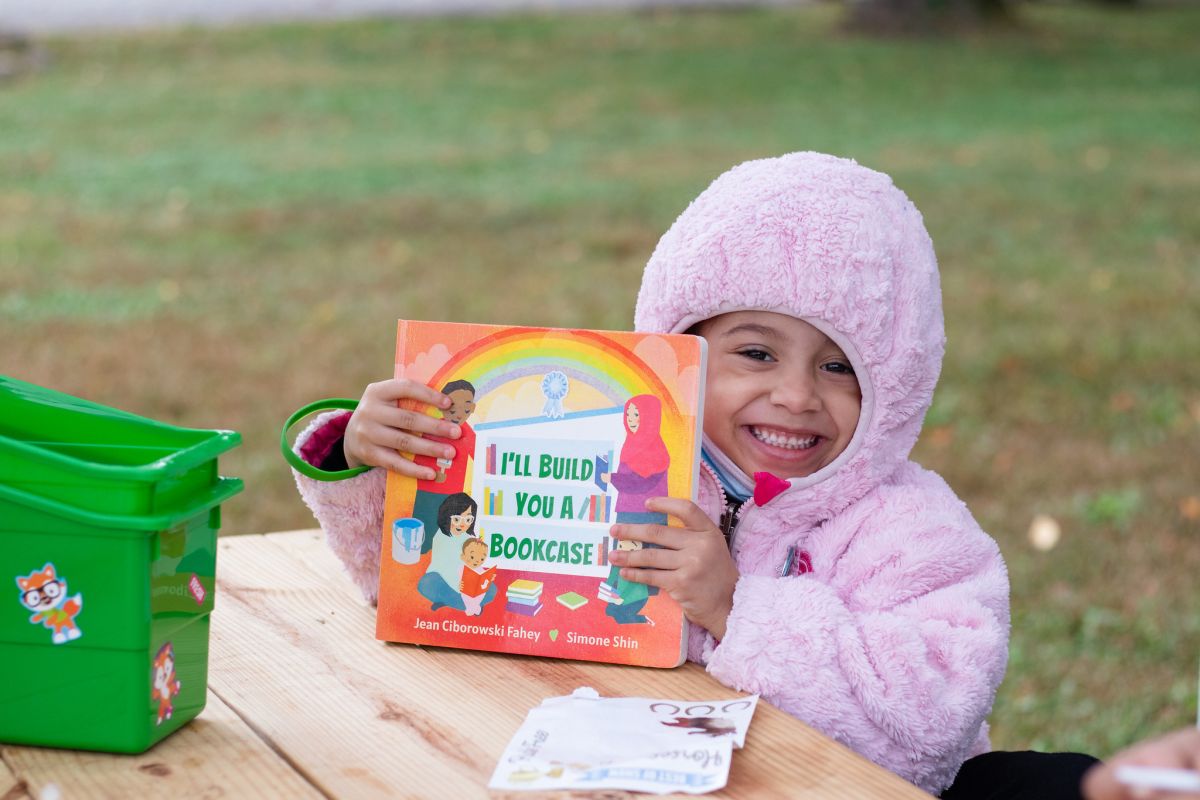
The School District of Philadelphia and the Penn Child Research Center at the University of Pennsylvania’s Graduate School of Education collaborated to create an online resource to support families and teachers to help children learn 14 important social-emotional learning skills. These skills are assessed on the kindergarten report card – including how to listen, accept responsibility, and get along well with others – and research demonstrates they are crucial for promoting learning.
The William Penn Foundation funded the creation of a website featuring evidence-based student support strategies for home and school. Local families and teachers provided input and suggestions based on their experience to ensure the website and tips are useful and applicable. Explore the website at www.CKPhilly.org.
In 2019, the William Penn Foundation funded the Children’s Hospital of Philadelphia (CHOP) to pilot an evidence-based tool, known as SPEAK, to measure parent knowledge of children’s early cognitive and language development need. CHOP used the SPEAK assessment tool in four of its pediatric practices to collect data on Philadelphia families’ perceptions and knowledge of early learning. The findings will inform new strategies to support families in building literacy for their children.
For example, in 2021, based on early findings from the SPEAK assessment tool, the Foundation supported CHOP to work with child development experts to create messages for medical practitioners to share about parent-child relationships, early learning, and healthy screen and media use that is responsive to the needs of families facing poverty and adversity. Through the project, CHOP will develop and pilot a toolkit to help medical practitioners more effectively communicate about early learning with families.
Text to Talk is an evidence-based program developed by Dr. Barbara A. Wasik at Temple University. The approach centers on teachers’ carefully crafted text messages to caregivers’ mobile devices. Their text messages share tips to encourage caregivers to use the words their children are learning in school that week, creating a bridge between school and home. Early findings suggest that vocabulary growth has been enhanced as a result of the tool and that many teachers and families are enthusiastic about using the tool to further engage families in their children’s learning. Partners are exploring ways to implement Text to Talk more broadly.
Read an interview with Dr. Wasik and research scientist Emily K. Snell in Education Week.
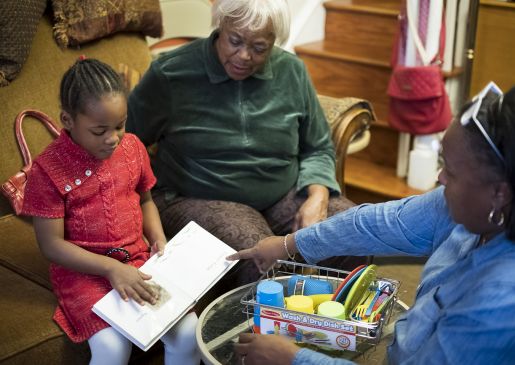
The trusting relationship and wealth of information provided by a home visitor creates an opportunity to enhance early learning in the home.
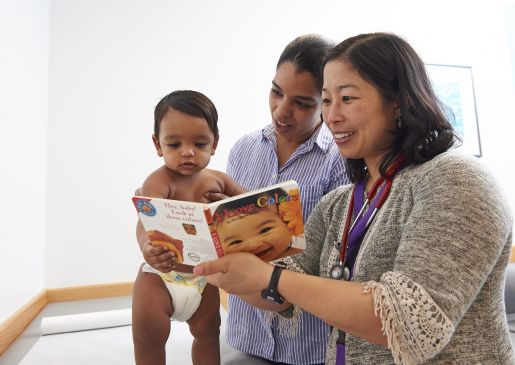
During a well-child visit at a doctor’s office that participates in Reach Out and Read, a pediatrician or nurse provides a family with brief guidance on reading aloud, along with a developmentally appropriate book for the child’s home library.
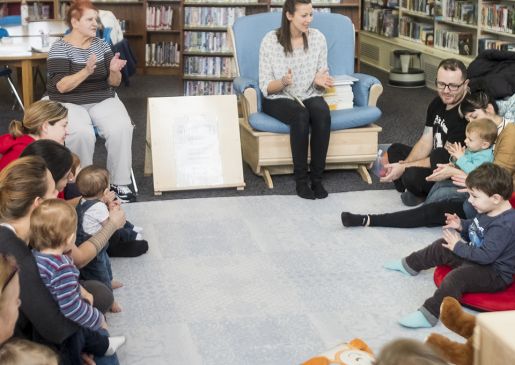
Read, Baby, Read, a program of the Free Library of Philadelphia, offers storytimes, play groups, and parent groups in new baby-friendly spaces. A staff member leads caregivers in song and reading techniques that they can replicate at home.
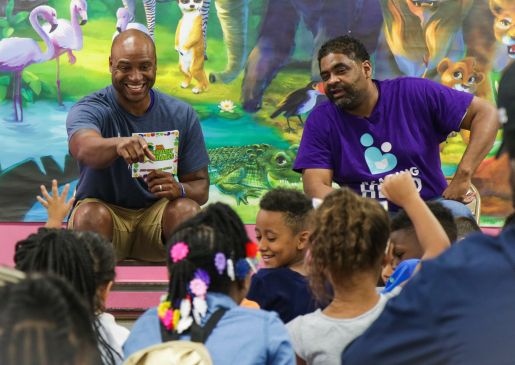
FathersRead365 engages parents and caregivers, with an emphasis on fathers, to rеаd daily with their children, providing active reading training and distributing books to Philadelphia families.
Progress Timeline





More Great Learning Stories
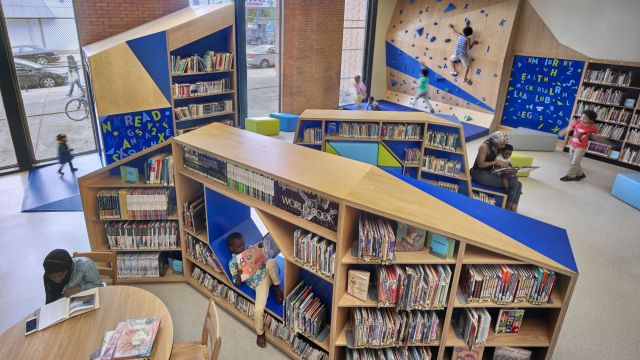
Prioritizing Play and Learning for People, Programs, and Policies
Learn More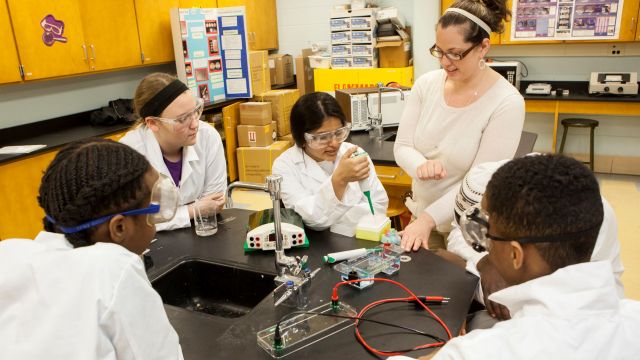
Supporting High School Students on the Path to Graduation
Learn More